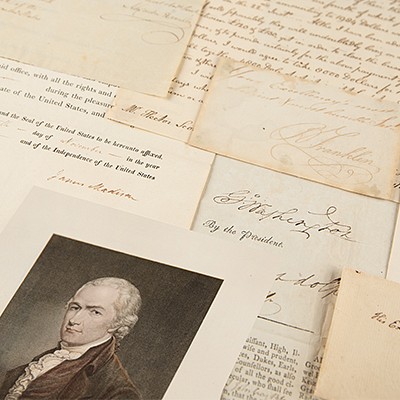Theodore Roosevelt Autograph Letter Signed as 'Rough Rider' Commander in Cuba
Two ways to bid:
- Leave a max absentee bid and the platform will bid on your behalf up to your maximum bid during the live auction.
- Bid live during the auction and your bids will be submitted real-time to the auctioneer.
Bid Increments
| Price | Bid Increment |
|---|---|
| $0 | $5 |
| $50 | $10 |
| $200 | $25 |
| $500 | $50 |
About Auction
Oct 11, 2023
RR Auction support@rrauction.com
- Lot Description
Significant war-dated ALS signed “T. Roosevelt, Col. Com. 2d Cavalry Brigade,” one page, 5.25 x 6.75, August 7, 1898. Handwritten letter concerning. In full: "Please let Trooper Bell, 1st U.S.V., who has been operated on for hernia, rejoin the regiment, now about to embark. The chaplain is the bearer of this." Handsomely corner-mounted, matted, and framed with a portrait of Roosevelt with the 'Rough Riders' and an engraved plaque to an overall size of 24 x 18. In very good to fine condition, with intersecting folds, and scattered light foxing.
In the spring of 1898, Theodore Roosevelt resigned from his post as Assistant Secretary of the Navy to take command of the 2nd Cavalry Brigade of the 1st United States Volunteer Cavalry, known as the 'Rough Riders.' The regiment was raised for the Spanish-American War and attracted an unusual mix of applicants: Ivy League athletes, glee club singers, Texas Rangers, police officers, and Native Americans. One volunteer was Sherman Bell, deputy marshal of Cripple Creek, Colorado, who Roosevelt later described as 'one of the gamest men I ever saw.'
On June 22, 1898, Colonel Roosevelt and his Rough Riders landed at Daiquiri, Cuba, amid swarms of mosquitoes and heavy rain. They met their first test two days later while advancing through the mountainous terrain at Las Guasimas. The hour-long skirmish cost them eight men, but the Rough Riders sent the enemy into full retreat toward Santiago in a strategic victory. Roosevelt's men went on to their famous victory at the Battle of San Juan Hill on July 1st.
These fights tested Trooper Bell's mettle, but he served with coolness and gallantry. Roosevelt later recalled: 'One of the men I took with me‰Û_ was Sherman Bell. The agony [from his hernia] was very great and one of his comrades took his load. He himself, sometimes walking, and sometimes crawling, got back to camp, where Dr. Church fixed him up with a spike bandage, but informed him that he would have to be sent back to the States when an ambulance came along. The ambulance did not come until the next day, which was the day before we marched to San Juan. It arrived after nightfall, and as soon as Bell heard it coming, he crawled out of the hospital tent into the jungle, where he lay all night; and the ambulance went off without him. The men shielded him just as school-boys would shield a companion, carrying his gun, belt, and bedding; while Bell kept out of sight until the column started, and then staggered along behind it. I found him the morning of the San Juan fight. He told me that he wanted to die fighting, if die he must, and I hadn’t the heart to send him back. He did splendid service that day, and afterward in the trenches, and though the rupture opened twice again, and on each occasion he was within a hair’s breadth of death, he escaped, and came back with us to the United States.'
After the success at San Juan Hill, Bell received the medical attention necessary while in Cuba, and Col. Roosevelt penned this note to ensure his return to the United States with his comrades-in-arms. On this day, August 7th, the Rough Riders embarked from Cuba for the United States, where they would be received with a hero's welcome. - Shipping Info
-
Bidder is liable for shipping and handling and providing accurate information as to shipping or delivery locations and arranging for such. RR Auction is unable to combine purchases from other auctions or affiliates into one package for shipping purposes. Lots won will be shipped in a commercially reasonable time after payment in good funds for the merchandise and the shipping fees are received or credit extended, except when third-party shipment occurs. Bidder agrees that service and handling charges related to shipping items which are not pre-paid may be charged to a credit card on file with RR Auction. Successful international Bidders shall provide written shipping instructions, including specified Customs declarations, to RR Auction for any lots to be delivered outside of the United States. NOTE: Declaration value shall be the item’(s) hammer price and RR Auction shall use the correct harmonized code for the lot. Domestic Bidders on lots designated for third-party shipment must designate the common carrier, accept risk of loss, and prepay shipping costs.
-
- Buyer's Premium



 EUR
EUR CAD
CAD AUD
AUD GBP
GBP MXN
MXN HKD
HKD CNY
CNY MYR
MYR SEK
SEK SGD
SGD CHF
CHF THB
THB













